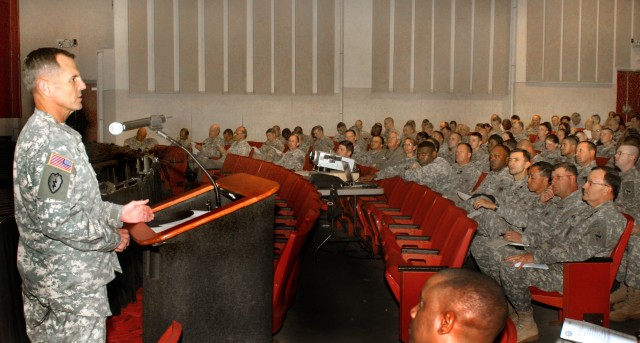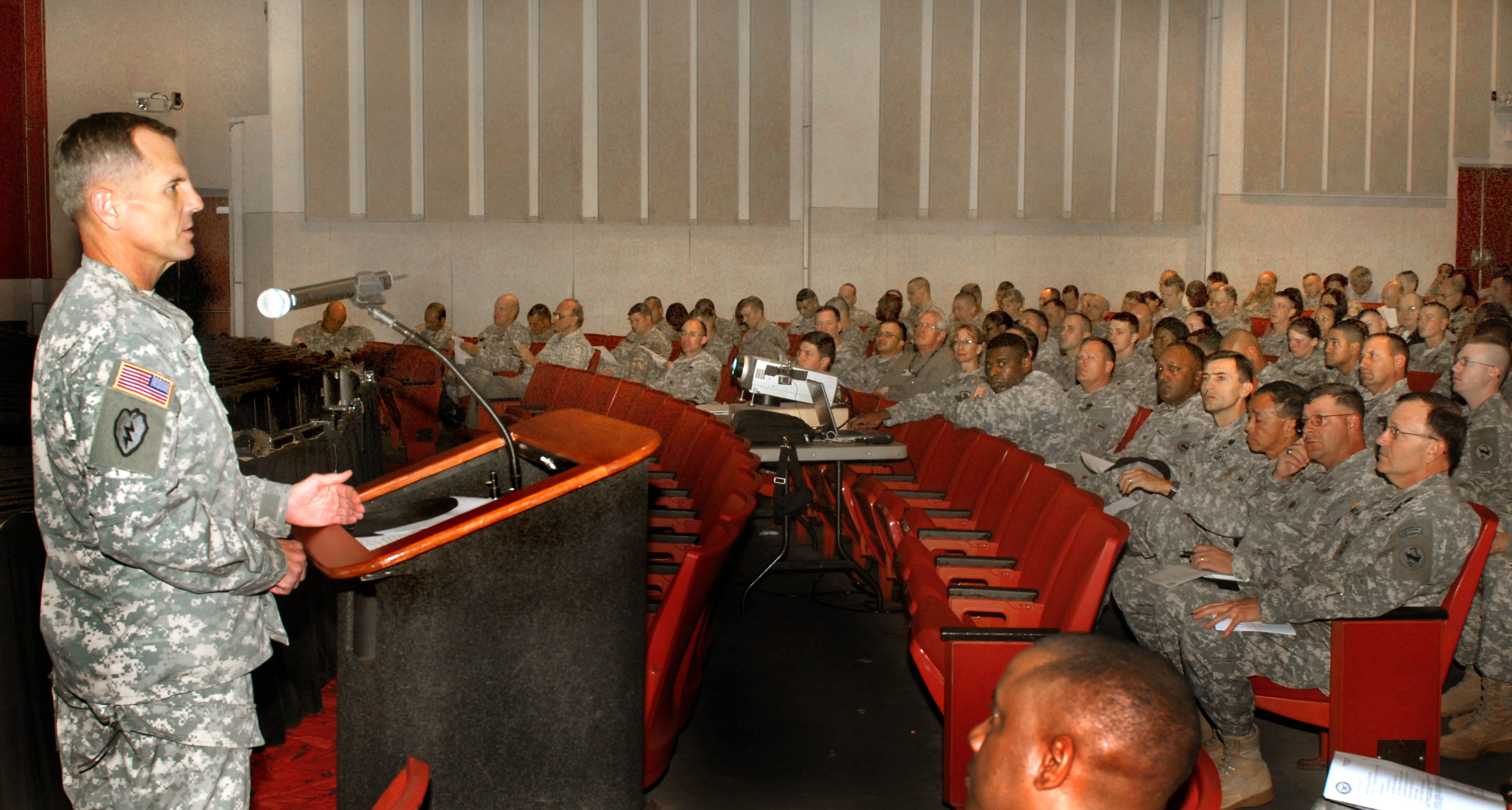FORT SHAFTER, Hawaii - It's a dark statistic. Last year, more than 140 Soldiers took their own lives, making 2008 the worst in the Army's history for preventable suicides.
To combat the growing numbers and make Soldiers and civilians aware of how they can recognize and prevent Soldier suicides, the U.S. Army, Pacific (USARPAC) headquarters are conducting stand-down training sessions from March 4 to 13 as part of the Army-wide Suicide Prevention Program. Follow-on chain-teaching will be conducted through mid June.
Hundreds of Soldiers and Department of the Army civilians of the U.S. Army, Pacific, assembled in Fort Shafter's Richardson Theater to view an interactive video entitled "Beyond the Front" which presented vignettes of Soldiers in deployment and post deployment, stress-related situations that could lead to suicidal behavior. Following each vignette as stresses on the Soldiers increased, the video was paused and offered the audience options on the Soldier's best course of action at that juncture. Brig. Gen. Stephen Jones, Commander, Tripler Army Medical Center facilitated the training session.
Correct courses of action tended to reduce or assist in coping with stress while the other scenarios presented actually increased anxiety.
Referring to the title of the video, Jones said, "The 'front' stands for the battlefield, but ' front' also stands for the face that a Soldier may put on to disguise the stress they are dealing with."
"You can make a difference," Jones emphatically told the audience. "This training shows you how to recognize the warning signs of suicide and more importantly, it shows how to deal with it, how to talk openly about depression and suicide and how to help Soldiers."
The "Beyond the Front" training is part of the Army-wide Suicide Prevention Campaign. Major elements of this program are designed to decrease the stigma that Soldiers feel when they're seeking help and encourage Families not to hesitate to ask for help. It is also designed to enhance coping skills and let Soldiers know that seeking help is actually a sign of strength and will not be detrimental to their Army career.
The training is conducted to inform all Army personnel, to include Families and civilian employees, of key issues that The Army's leadership believes are of value for everyone to know about suicidal behavior and to help recognize warning signs and risk factors of those persons who might be considering harming themselves.
"This is a leader responsibility, but it is everyone's responsibility to take care of," said U.S. Army, Pacific Commander Lt. Gen. Benjamin R. Mixon, who introduced Wednesday's training. "It is only a start to give you some good information , some background of what's going on. What we really need is for every leader, whether you are in or out of uniform, to be knowledgeable of and working towards preventing suicide."
Those who attended the training agreed that knowing methods of suicide prevention are important.
"I think this training is a good way for us to be made aware of possible signs for Soldiers and risks, especially since some of us work in pretty high stress environments," said Staff Sgt. William Kesper, USARPAC Fires and Effects.
"It's always a good thing to have this kind of training, especially with new Soldiers coming off of recent deployments," added Staff Sgt. William Celley, USARPAC Fires and Effects. "It's good to learn what to watch for."
"If one of your buddies is engaging in risky behaviors, they're not thinking right, they're not making the right decisions on their own, so it's going to be up to you to help them make that decision," said Jones. "There's no definite way to predict it, but the vast majority of individuals exhibit certain signs or symptoms, like receiving the 'Dear John' or 'Dear Jane' letter, abusing alcohol, experiencing financial difficulty, pending Uniform Code of Military Justice action, exhibiting poor job performance or having a history of depression."
In addition to the video, attendees were given a laminated "ACE" of hearts playing card and suicide prevention training tip card that they can keep in their wallet for easy reference. The acronym "ACE," stands for Ask, Care and Escort.
The card encourages having the courage to calmly:
Aca,!Ac Ask if a Soldier is thinking of suicide,
Aca,!Ac Care by actively listening or removing any means that could be used for self-injury and
Aca,!Ac Escort the individual to a chaplain, chain of command, behavioral health professional or primary care provider.
"The loss of any Soldier's life is a tragedy, regardless of the cause, and suicide prevention is critical to all of us," said Jones. He drew an example from the Soldier's Creed. "You remember that the Warrior Ethos says to never leave a fallen comrade. Failing to act and intervene when you've got a buddy that needs help equates to leaving a fallen comrade," Jones said.
"We really need to get over the stigma and need to help our Soldiers to realize that recognizing that they need help is a sign of strength and not weakness."
A number of resources are available for assistance. Anyone can call the on-call chaplain at (808) 656-3272. At Tripler and Schofield Barracks, there are a number of available places to call, to include the Adult Psychiatry Clinic (433-2737), the Child and Adolescent Psychiatry Clinic (433-6418) and the Tripler emergency room at 433-3707. The Soldier Assistance Center (433-8600) on Schofield Barracks can assist as well.
Online, www.militaryonesource.com provides assistance. The Veterans Suicide Hotline at 1-800-273-TALK or the National Suicide Hotline at 1-800-SUICIDE are both available 24 hours.


Social Sharing